If you’re missing teeth, we offer various types of dentures to give you the best replacement for your needs. Our team of dentists have the experience and skill to complete your smile with beauty, confidence and health. If you’re ready to improve your quality of life with a full set of teeth, contact our office today! In the meantime, you can read on to learn more about our dentures in Naples and how you could benefit from them.

Ultimately, almost anyone with tooth loss can qualify for dentures. Being suited for treatment doesn’t require much else. Of course, you should still consult our dentists before deciding anything. They and the rest of Galleria Dentistry will confirm if you’re a good dentures candidate. Even if you’re not, you can become one later through dental work. To learn more, continue reading or call us for relevant details.

As you consider dentures, it’s a good idea to review tooth loss’ causes and effects. By doing so, you’ll better grasp how dentures might help you.
In terms of causes, tooth loss happens for various reasons. Teeth can sometimes decay to the point they fall out or need extraction. At other times, a gum infection might wear down the tissues securing your pearly whites. Some patients even get their teeth knocked out from a sports injury or accident.
Missing teeth effects are narrow but severe. For instance, a notable one is that eating, speaking, and smiling get harder. Another result of tooth loss is smile gaps, which cause jawbone erosion. (An eroded jawbone results in facial collapse if left alone.) Those same spaces can also lead to yet more tooth loss.

Most patients with missing teeth are good candidates for dentures. All the same, other qualifying factors do exist.
Your oral health is one such factor. After all, you need healthy gum and jaw tissues for dentures to work. That means a good dentures candidate must be committed to oral care. On the other hand, the state of your remaining teeth can impact matters. You might want dentures to replace sensitive or decaying ones.
You should also consider how many teeth you’ve lost. Depending on the number, you’ll need a partial denture or a full one. The first kind (per its name) only replaces a few of your teeth. Meanwhile, the second restores all the pearly whites along the upper or lower arch.
Finally, review your budget ahead of treatment. Dentures cost money like any other product does. Luckily, though, these restorations are cheaper than other options. They’re thus ideal for patients looking for low-cost care.
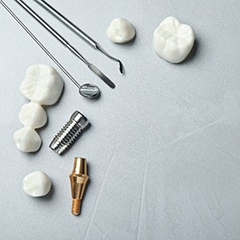
You don’t need to panic if you’re not a good dentures candidate. Here at Galleria Dentistry, we offer several other tooth-replacement options. The most notable of these are:

Dentures have been used for hundreds of years to replace missing teeth. Thankfully, modern dentistry allows us to offer our patients a more comfortable, lightweight, and realistic-looking denture than ever before. This prosthetic is a tooth replacement for the upper or lower jaw. We design dentures to look like your natural smile, attaching ceramic or acrylic artificial teeth to a gum-colored base. Here’s how these prosthetics are made so you know what to expect when receiving your brand-new pearly whites.
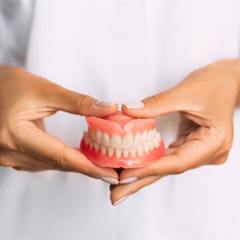
Dentures are comprised of two essential components: the base and the teeth. This is what each consists of:
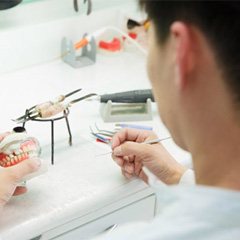
Dentures involve a multi-step process, which typically follows these steps:

It will take some time to get used to wearing your dentures, so there’s no need to worry about them when first putting them on. Some patients also feel mild discomfort or soreness, but this should only be temporary. With practice and repetition, you should be able to speak, chew, and smile more naturally. To make this process run smoother, make sure to eat softer foods that don’t require a lot of chewing, exercise your facial muscles often, and try using denture adhesive when necessary. Give our team a call if you notice any discomfort persisting for too long, and we’ll be happy to help.

In order to give our patients the replacement that works best for them, we offer 3 different types of dentures:
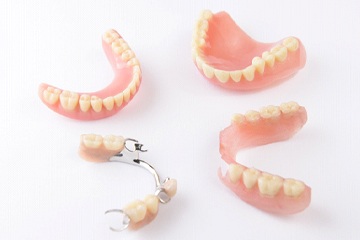
Dentures are a life-changing tooth replacement option for those who are missing multiple, most of, or all of their teeth. They are able to restore the appearance and function of your smile. Continue reading to learn some of the incredible benefits that you can experience when you replace your missing teeth with dentures.

If you no longer have any healthy teeth, this can be a difficult thing to accept. Many sufferers of extensive tooth loss encounter negative effects on their self-esteem and confidence, leading to a high risk of sadness and depression. When you restore your smile with dentures, you can feel better about your image, reducing anxieties about your appearance, speech articulation, chewing ability, and much more!

With gaps in your smile, it can be challenging to enunciate certain sounds and say different words. To pronounce words, your lips and tongue need to be positioned properly. When there are gaps in your smile. Your tongue isn’t able to sit against the teeth, making some words very difficult to say.

Many nutrient-dense foods are tough in texture. This includes healthy proteins, fruits, and vegetables. If you are unable to chew your food thoroughly due to tooth loss, this can negatively influence your eating habits. Ultimately resulting in indigestion and malnutrition. With dentures, you can chew your food more easily, giving you the freedom to enjoy a more expansive diet.

If you still have some healthy teeth, dentures can help to keep them in even better shape. By filling in the gaps with a partial denture, you can keep the surrounding teeth from shifting around. Dentures also help to bear some of the weight of routine biting and chewing, limiting the wear and tear of your remaining natural teeth.

When you attend interviews, negotiate sales, and attend social events, making an excellent first impression is key! Since your smile is one of the very first things that people notice about you, having teeth that appear to be healthy will do nothing but help. In fact, studies have found that the probability of being employed is negatively associated with poor dental health.

It’s hard to put an exact price tag on dentures without first learning more about the specifics of your situation. We can give you an idea of what the cost of your dentures will look like after we have had a chance to examine your smile. On top of that, we can go over your payment options and help you determine the best way to make dentures affordable. We want you to be able to enjoy a complete smile again at a price that’s right for your wallet.

There are several factors that can end up influencing the amount you pay for your dentures. For example, some patients might need to have their remaining teeth removed before they can receive their prosthesis. Tooth extractions and any other preparatory procedures that might be required can add to the overall cost.
Then there’s the material that the dentures will be made of. The base is typically composed of acrylic while the artificial teeth are often made of porcelain, but different materials can potentially be used for both. The cheapest materials aren’t necessarily the best choice since they break more easily in many cases and may need to be replaced sooner.
Finally, there’s the type of denture that you need. A partial denture will not carry the same cost as a full denture. The number of teeth missing will help determine the kind of denture that best suits your case.

Yes, implant dentures are typically more expensive since you need to pay for dental implant surgery in addition to the denture itself. However, the higher initial cost of implant dentures is balanced out by their many benefits, such as providing stimulation to the jawbone. On top of that, implant dentures can last far longer than traditional dentures and thus don’t need to be replaced as often, which can make them the more cost-effective option in the long run.

Not all dental insurance plans are the same, and it’s always worth double-checking to make sure that you understand your benefits. That being said, most dental insurance companies will offer some level of coverage for dentures. Many plans will pay around 50% of the cost of the prosthesis since dentures are normally considered a major procedure. Our practice accepts all dental insurance plans and can file the necessary claims on your behalf so that you don’t have to worry about it.

If you don’t have dental insurance, you may be concerned about your ability to pay for dentures. Luckily, there’s an alternative in the form of financing. Our practice gladly accepts CareCredit payment plans, which come with low-to-no interest and have no hidden fees to worry about. Please reach out to us if you would like to learn more about how financing works at our practice.

What will you need to do to take care of your dentures? For one thing, you should continue seeing your dentist even if you don’t have any natural teeth left. They’ll be able to examine your dentures to see if they have become damaged or worn down; they can also check for signs of gum disease as well as potential symptoms of oral cancer.
As for the kind of care that you should give your dentures at home, our team will provide detailed instructions once you have received your final prosthesis. Below are some of the most important steps you’ll need to follow for good denture maintenance.
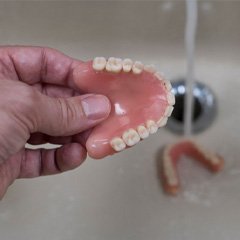
Just like your natural teeth, your dentures need to be cleaned regularly to ensure that no food debris is left behind. Whenever you finish a meal, head to the nearest available sink, take out your dentures, and rinse them off gently. Make sure that the water isn’t too hot; heat can cause your dentures to change shape, and they might not fit on the gums as well afterward.
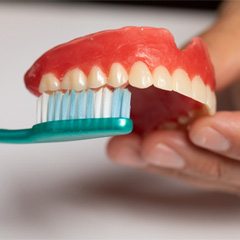
Dentures need to be cleaned on a daily basis. You can use a denture cleanser, but brushing it with unscented hand soap or mild dish soap can also be an effective way to get rid of harmful bacteria. Make sure that the toothbrush you’re using has soft bristles that are unlikely to damage the materials that the denture is made of.
When you don’t plan on putting your dentures back in your mouth right away, keep them in a denture-cleaning solution; they need to stay moist at all times.
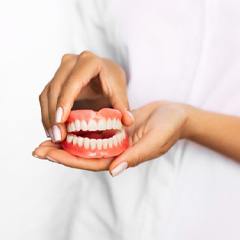
You should take a few simple precautions to lower the odds of your dentures becoming damaged by accident:

As tempting as it can sometimes be to simply go straight to bed while leaving your dentures in your mouth, your prosthesis should always be removed at night. It’s not healthy for your jawbone or your gum tissue to wear your dentures 24/7. Furthermore, since the area between the dentures and the gums tends to be moist and dark, leaving your dentures in for too long could lead to bacteria buildup.

Certain changes could indicate that your dentures need to be repaired or replaced soon. Call us right away if:

Dentures in Naples have been used for generations to rebuild complete smiles for patients who have experienced severe tooth loss. Although they are tried and proven, veneers are a big investment, and it's normal to have a few concerns about the road ahead. Your dentist at Galleria Dentistry will explain everything at your consultation to ease any apprehensions. While you wait for your appointment, here are the answers to the most frequently asked questions.
Your dentist will instruct you to wear your dentures for 24 hours after receiving them. However, after the first day, get in the habit of taking them out before going to bed. No one wants to be caught without their teeth, but your gums need a break. Your dentures will restrict blood circulation to the soft tissues, which can lead to sores, inflammation, and infections if your gums aren't given time to recuperate. Removing your dentures at night allows your gums to get the vital nutrients they need to stay healthy. Besides brushing your dentures before bed, place them in an overnight soaking solution to kill any bacteria left behind by your toothbrush. You'll keep your mouth healthy and prolong the lifespan of your dentures.
It's not unusual to have concerns about an upper denture changing the way food tastes. However, a top denture doesn't always have to cover the roof of your mouth. There are many types of dentures to choose from, like those with a horseshoe shape. It will look like a denture used for the lower arch or along with dental implants. Your denture dentist in Naples will explain all your options to find the perfect denture for your needs and preferences.
Although your dentures may look like your real teeth, they can't be cleaned the same way. Toothpaste can be abrasive, which can scratch your dentures. Not only can this make them look discolored, but food particles and plaque can get trapped in the small crevices, weakening your denture over time and causing unpleasant odors. It's best to use a soft-bristled toothbrush and not abrasive toothpaste or a mild dishwashing liquid. You can also purchase over-the-counter cleaning kits designed for denture wearers.
It's entirely possible to eat steak with dentures, but your dentist will advise you limit how often you eat it. Chewy meats will put additional wear and tear on your denture, which can cause you to need replacements sooner. It can also cause sore gums and jaw pain from prolonged chewing. If you can't resist a juicy steak, cut it into small pieces to make it easier to chew. A denture adhesive can also provide additional stability, so you don't have to worry about your teeth falling out on your dinner plate.